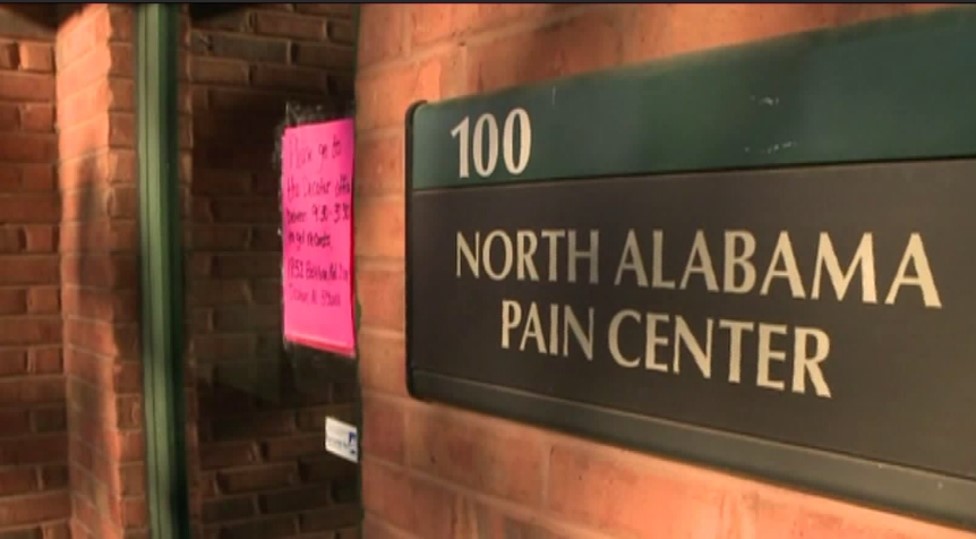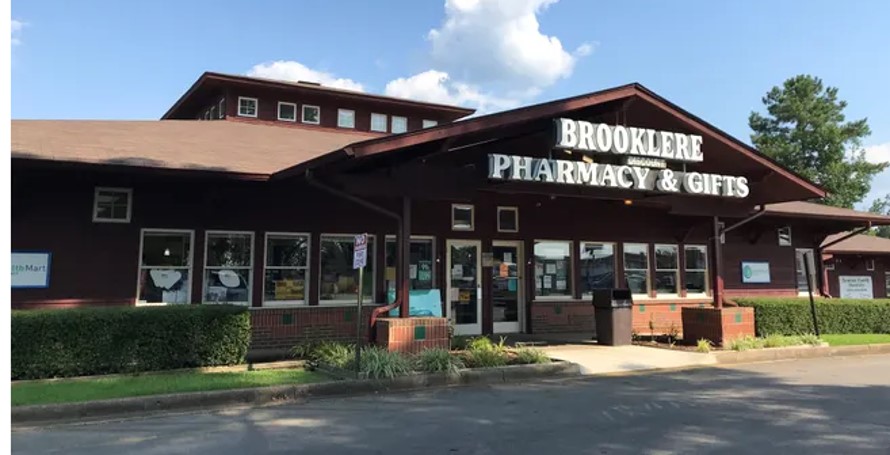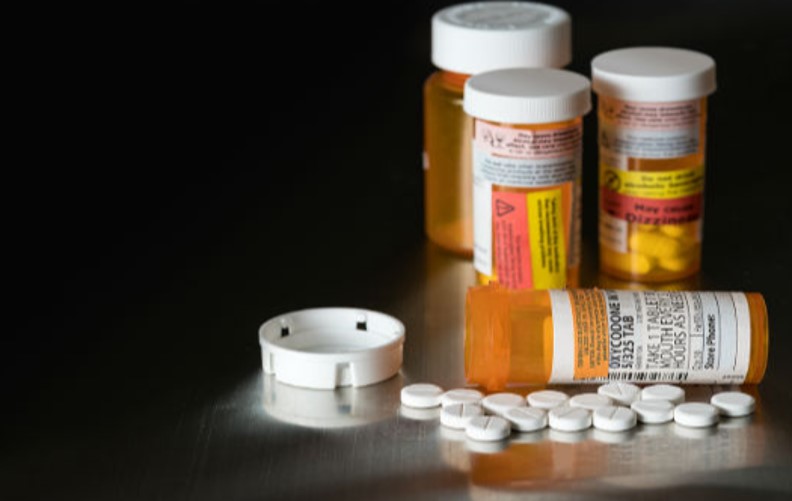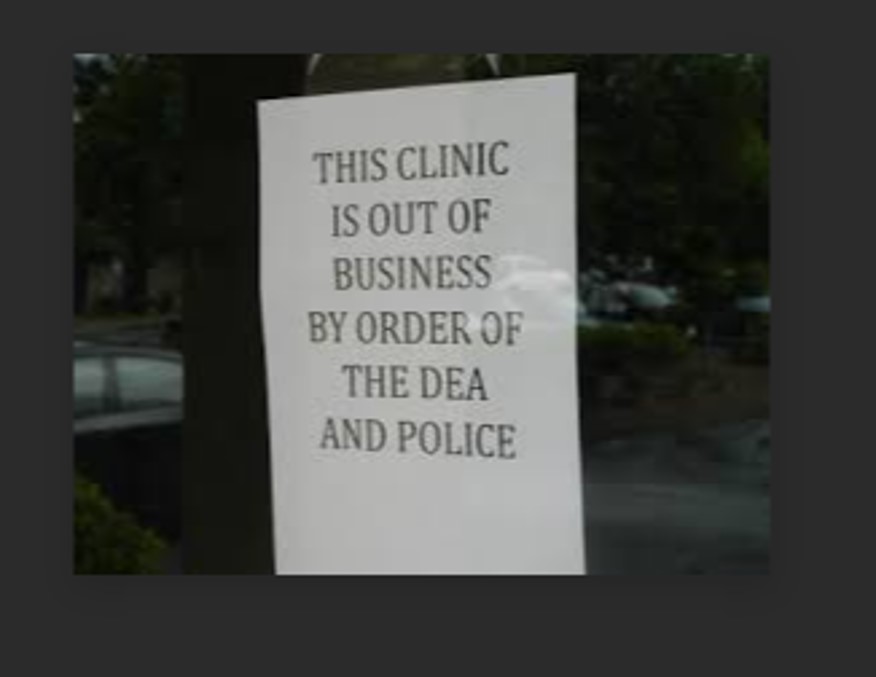
As the fight against the opioid crisis continues, authorities are shutting down rogue pain clinics that prescribe huge amounts of oxycodone pills and hook people with chronic pain and drug addiction.
Practitioners are required or recommended to both perform a physical examination on the patient and to assess potential substance abuse disorder prior to prescribing opioids.
Medical professionals are increasingly operating pill mills disguised as pain relief or pain management clinics, wellness centers, medical centers, among others. These owners and operators continually devise methods to subvert regulations while attracting local and out-of-state patients.
IMPORTANT NOTE: Not all pain management clinics are engaged in criminal activity. Many clinics across the state operate legally and employ trained personnel and doctors who treat patients who legitimately suffer from chronic pain.
Oxycodone was a money-maker through increased patient visits for pain management center owners, physicians, nurses, and operators. Pain management clinics where those with complaints of chronic pain are supposed to find long-term solutions but instead are offered prescriptions for massive doses of the prescription drug.
Someone with legal authority to prescribe opiates is required, thus doctors, physician’s assistants, and nurse practitioners were in high demand for these pain clinics and medical centers.
According to court documents and evidence presented at trial, Dr. Mark Murphy and his wife Jennifer Murphy owned and operated North Alabama Pain Services (NAPS), which closed its Decatur and Madison offices in early 2017. Dr. Mark Murphy was the sole doctor at the two locations, and the evidence at trial showed that some patients went months or years without seeing him during their monthly office visits, even though they continued to get opioid prescriptions that he had pre-signed.
Over the approximately five-year period leading up to the clinic closing its Alabama locations, although oxycodone is commonly prescribed in 5-milligram tablets, Murphy wrote prescriptions for more than ten million opioid pills, including millions of oxycodone 30-milligram tablets.
During the same five-year period, Dr. Murphy and his wife Jennifer, who helped run the clinics, ordered tens of millions of dollars of unnecessary items and services that were paid by taxpayer-funded and private insurance programs. The Murphys received kickbacks for those orders and prescriptions. In all, Medicare, TRICARE, and Blue Cross Blue Shield of Alabama were billed more than $280 million as a result of the fraud and kickback schemes, and paid more than $50 million. Dr. Mark Murphy and Jennifer Murphy were each ordered to pay more than $50 million in restitution. Jennifer Murphy was also convicted of tax-related charges for under-reporting clinic income.
“The abuse of prescription drugs, especially opioids, is a serious problem in our communities,” said DEA Assistant Special Agent in Charge Towanda Thorne-James. “All too often, this abuse leads to addiction, shattered lives, and even death. For the health and safety of our citizens, DEA and our law enforcement partners will continue to target those who illegally distribute these potentially dangerous drugs. We hope that the sentences in this case serve as a reminder to anyone who might illegally divert pharmaceuticals that they will be held accountable for the harm they cause.”
The Fraud Section leads the Appalachian Regional Prescription Opioid (ARPO) Strike Force. Since its inception in October 2018, the ARPO Strike Force, which operates in 10 districts, has charged more than 90 defendants who are collectively responsible for distributing more than 105 million pills. The ARPO Strike Force is part of the Health Care Fraud Strike Force Program, which since March 2007 has charged more than 4,200 defendants who collectively have billed the Medicare program for more than $19 billion. In addition, the Centers for Medicare & Medicaid Services, working in conjunction with the Office of the Inspector General for the Department of Health and Human Services, are taking steps to hold providers accountable for their involvement in health care fraud schemes. More information can be found at: https://www.justice.gov/criminal-fraud/health-care-fraud-unit.
According to the DEA, leads about potential pill mills come from several sources. Pharmacies are typically the front line (and often the last line) of defense in identifying irregular prescribing practices. Consumer complaints about the comings and goings of “patients” and local law enforcement reports can trigger undercover investigations of potential pill mills. Intercepted mail deliveries may also tip off authorities. Medical examiners’ offices, which investigate overdose deaths, often trace prescriptions to their source and detect problematic prescribing patterns.

Dr. Mark Murphy, 65, and his wife, Jennifer, 65, both from Lewisburg, Tennessee, owned and operated North Alabama Pain Services. Prim Escalona, a U.S Attorney for the Northern District of Alabama, said evidence showed both Murphys solicited and received unlawful payments for referring fraudulent or unnecessary services to patients. Both Murphys faced a maximum of 20 years in prison for the drug charges.
After Dr. Mark Murphy closed the Alabama clinics he continued to work from his Tennessee practice in Lewisburg which was raided by FBI agents in 2018 and was indicted in 2020 along with his wife and four other people.
BIRMINGHAM, ALABAMA. Dr. Rodney Morris, 64, pleaded guilty before a U.S. District Court Judge to 64 counts of illegally distributing and dispensing Schedule II controlled substances, including opioid painkillers, outside the scope of professional medical practice and not for legitimate medical purposes. The evidence showed that Dr. Morris prescribed these painkillers in exchange for sexual favors and monetary gain.
Records show that between August 2012 and May 2017, Dr. Morris illegally prescribed one particular patient hydrocodone, alprazolam, oxycodone and tramadol in exchange of sexual favors. This patient illegally sold some of these drugs to supplement her income. After the patient’s death in May 2017, Dr. Morris attempted to delete electronic medical records and erase evidence of her being his patient.
DEA ASAC Clay Morris said. “Dr. Morris’ actions clearly contributed to continuing the opioid epidemic that is plaguing our communities and country. He will soon be where he belongs…in prison. The DEA, U.S. Attorney’s Office and our law enforcement partners will not stand idly by and allow criminals to profit off of the addictions of others.”
The penalty for illegally dispensing and distributing prescription drugs is a maximum of 20 years in prison and a maximum fine of $1,000,000.

Between 2006 and 2012, more than 66 million opioid pills, through legal prescriptions, flooded into Walker, a relatively rural county nestled in the hills between Birmingham and Tupelo, Mississippi.
Walker County, with a large hospital in its county seat of Jasper, numerous doctors offices and pharmacies, was known as a hot-spot for easy prescriptions. One witness saw some people with legitimate medical needs—but desperate for cash—sell their own pills. As addictions spiraled, it also fell prey to doctor shopping, even though surrounding counties in northwest Alabama, such as Marion and Franklin, had already high prescribing rates.
Opioid pills are legitimate medications sorely needed by some patients. But more than 1.7 billion pills blanketed Alabama between 2006 and 2012, feeding a beast officials now call a public health crisis of epidemic proportions. The DEA data pinpointed Walker County as the epicenter of Alabama’s crisis, and as one of the worst counties in the nation, with just a dozen or so counties in the nation with a higher pill-per-person rate.
More than 9 million pills alone flooded one single pharmacy in Sumiton, home to fewer than 2,500 people. The Brookelere Pharmacy was outpaced in Alabama only by a pharmacy in Huntsville, a major metro area and a distribution pharmacy in Northport that provides medications to more than 80 other medical facilities.

“If you watched the parking lots in Jasper on the third of the month, it was crazy how many people would come in from different counties,” one witness said. “You could stand at the window and watch the drug trade.”
“We had doctors in Jasper who would stay open until 9 and 10 at night to see people.” “Oxy 80s, bars of Xanax, Adderall. People would go in with a list of what they wanted, $300 or $400, and people would write prescriptions. They were everywhere. They were so easy to find. They chased them all day long, and they would do whatever they had to do to get them.”
Judge Allred estimated more than 90% of property crime—petty theft, receiving stolen property, breaking and entering to find a place to stay or a safe place to take drugs—was directly related to Walker County’s drug issues, cycles of addiction, and criminal justice that spiraled out of control while drug manufacturers and prescribers raked in profit.
MOODY, ALABAMA. CINDY LOUISE HYCHE DUNN, 53 and THOMAS MASON DUNN, 56
A 20-count indictment filed in U.S. District Court charged CINDY LOUISE HYCHE DUNN, 53, her husband, THOMAS MASON DUNN, 56, and Dr. JOHN LADD BUCKINGHAM, 85, in a conspiracy to operate a clinic in Moody for the main purpose of illegally distributing or dispensing controlled substances outside the usual course of professional practice and not for a legitimate medical purpose. The object of the conspiracy was for the participants to enrich themselves, according to the indictment.
From January 2012 through December 2015, Cindy Dunn ran a pain management clinic in Moody, Alabama operating under the name Cindy Dunn & Dr. Buckingham, M.D., Weight Loss Clinic and Pain Management (CDPM). CDPM was not a legitimate pain clinic. It was a pill mill churning out thousands of prescriptions for opioid painkillers. Thomas Dunn performed financial transactions on behalf of CDPM to further the pill mill scheme. He also received prescriptions for opioid painkillers from CDPM.
As the owner and president of CDPM, Cindy Dunn ran its day-to-day operations, and hired and directed physicians and staff. Two doctors issued the majority of CDPM’s controlled substance prescriptions, neither were pain management specialists. John Ladd Buckingham was CDPM’s primary physician while Steven Bruce Hefter also issued prescriptions for CDPM at various times. CDPM attracted patients from all over Alabama and outside the state. Patients came from Huntsville, Muscle Shoals, Florence, and Mobile, Alabama. Patients also flocked to CDPM from Florida, Georgia, and Tennessee. CDPM received anywhere from 40 to 80 patients in a single day.
Cindy Dunn, Buckingham and other co-conspirators prescribed more than 13,500 methadone-based pills to one patient and more than 8,200 oxycodone-based pills to another patient, according to the indictment. They also prescribed more than 7,900 oxycodone-based and methadone-based pills, collectively, to a single patient, and 7,700 oxycodone-based and methadone-based pills, collectively, to a different patient, the indictment says.
CDPM typically charged a $25 patient application fee, a $200-$300 clinic visit fee for new patients, then a $90-$125 monthly fee for follow-up visits, according to the indictment. The clinic did not accept insurance, requiring cash or credit payments. Patient examinations were “infrequent, and were typically minimal and cursory.”
According to her plea agreement, Cindy Dunn had no formal medical education, qualifications, or licensing, yet she directed, oversaw, and guided prescriptions for opioids and other controlled substances at CDPM. For example, Cindy Dunn allowed patients to continue receiving opioid prescriptions after failing multiple drug tests. She also permitted patients who admitted buying pills on the street and/or who had a history of drug abuse to receive opioid prescriptions. It further states that Cindy Dunn devised a system for pre-signing prescriptions in order to maximize revenue. CDPM staff wrote prescriptions, which the doctors signed far in advance of patient visits. The pre-signed prescriptions were then handed to patients in exchange for cash without the doctor seeing the patient. Cindy Dunn, Thomas Dunn, and others used the money generated through CDPM’s pill mill scheme to continue CDPM’s operations, according to both plea agreements.
“The Dunns had no business running a pain management clinic,” said Assistant United States Attorney Mohammad Khatib. “They harnessed the prescribing power of their physician co-conspirators for the sole purpose of making fast money. Their greed spread the opioid epidemic in Alabama and inflicted real damage on the legitimate medical community. For that, they must pay a very dear price.”
“This was a classic example of a pill mill and these individuals will be held accountable,” Holloman said. “We will continue to work with our law enforcement partners in tackling the opioid epidemic head on in the state of Alabama. In following the money, you can trace the drug proceeds to the beneficiaries and bring the entire conspiracy ring to justice.”
CDPM typically did not treat patients with anything other than high doses of opioid painkillers, according to Cindy Dunn’s plea agreement. Prescribed opioids included fentanyl, hydrocodone, methadone, morphine, oxycodone, and oxymorphone. CDPM rarely, if ever, ordered diagnostic tests, such as x-rays or MRIs, to identify and potentially treat the source(s) of pain. Patients often received opioid prescriptions or dosage increases upon request. CDPM also issued prescriptions for a combination of drugs known as “the holy trinity,” which consists of an opioid painkiller, a muscle relaxer, and a benzodiazepine. The plea agreement states that this “cocktail” has a high potential for abuse and carries a significant risk of overdose.
“This couple operated a pain management clinic with reckless disregard for patient safety,” U.S. Attorney Town said. “To those who continue to poison our communities by this illegal practice and enable the growth of the opioid crisis in our state, you will be caught, you will be prosecuted, and you will have a bed in federal prison.”
Both the conspiracy to distribute controlled substances outside the usual course of professional practice charge and each substantive count of illegally distributing controlled substances carry a maximum penalty of 20 years in prison and a $1 million fine. The charge of maintaining a drug-involved premises carries a maximum penalty of 20 years in prison and a $500,000 fine. Money-laundering conspiracy carries a maximum penalty of 20 years in prison and a $250,000 fine. Engaging in monetary transactions involving criminal proceeds carries a maximum penalty of 10 years in prison and a $250,000 fine.
“This investigation demonstrates the fact that if you are a doctor in the state of Alabama and you are illegally prescribing controlled substances we will find you and you will pay a heavy price,” Acting Assistant Special Agent in Charge Langan said. “This is another example of the great teamwork between federal, state, and local law enforcement partners to positively impact the lives of the good people living in our communities.”
“Pill Mills continue to plague our communities as the illegal distribution of prescription drugs remains a profitable criminal enterprise,” Special Agent in Charge Holloman said.
If you suspect a medical office or pain management clinic may be a pill mill, it’s essential to report it to the authorities. You can submit your anonymous tip through the DEA online Tip Line.
MONTGOMERY, ALABAMA. Dr. Gilberto Sanchez, 56, was sentenced to serve 12 years and 1 month in prison for prescribing unnecessary controlled substances to his patients, committing health care fraud, and laundering money.
For years, Dr. Sanchez operated a medical practice located at 4143 Atlanta Highway in Montgomery. At that practice, Dr. Sanchez gave patients prescriptions for controlled substances knowing that the patients did not need the medicine and would, in fact, abuse the drugs. Among the drugs Dr. Sanchez unnecessarily prescribed were dangerous opioids, including oxycodone, hydrocodone, and fentanyl. Dr. Sanchez also gave out illegitimate prescriptions for amphetamines, including Adderall, and benzodiazepines, including Xanax.
To ensure that his scheme was a profitable one, Dr. Sanchez required his patients to return to his office each month and undergo physical examinations before receiving prescription refills. These office visits were unnecessary, as their only purpose was to facilitate Dr. Sanchez giving the patients illegitimate prescriptions. Nevertheless, Dr. Sanchez performed these unnecessary examinations so that he could get money from the patients’ insurance companies. This scheme led to Dr. Sanchez’s health care fraud conviction.
The money laundering charges stem from Dr. Sanchez’s spending the proceeds of his operation of a pill mill. Court documents describe Dr. Sanchez using those proceeds to purchase at least one vehicle and one personal residence located in Montgomery.
United States District Judge Myron H. Thompson told Dr. Sanchez that he was imposing the strong sentence because of the significant toll Sanchez’s criminal conduct took in the lives of Dr. Sanchez’s patients and employees. The judge noted that many of the patients were unusually vulnerable due to drug addictions. Judge Thompson also stressed the amount of money Dr. Sanchez obtained from his scheme, which was at least $3.5 million dollars.
MONTGOMERY, ALABAMA. Dr. Willie J. Chester, Jr., 64, of Pike Road, Alabama, and Nurse Stephanie Michelle Ott, 42, of Fairhope, Alabama, were alleged to have assisted Dr. Gilberto Sanchez in operating a “pill mill” out of Family Practice, a medical clinic located at 4143 Atlanta Highway in Montgomery. The indictment alleges that Dr. Chester worked at Family Practice in 2016 and 2017, and, during that time, he prescribed controlled substances to patients knowing that the patients did not need the prescribed medicine. As for Ott, the new indictment chargeed her with conspiracy and health care fraud. The factual allegations against Ott state that, in 2015, Family Practice employed Ott as a consultant. In that role, Ott implemented a billing system that caused the practice to overbill health insurance companies for services provided by nurse practitioners.
Dr. Julio Delgado, 56, of Homewood, Alabama, pleaded guilty to aiding and abetting the fraudulent acquisition of controlled substances. According to court documents, Dr. Delgado worked for Sanchez at Family Practice during 2015 and 2016. During that time, Dr. Delgado saw some of Dr. Sanchez’s patients when Dr. Sanchez was too busy. In open court, Dr. Delgado admitted to writing a prescription for someone who was never his patient and without ever examining the person.
Doctor Gets 10 Years for Operating a Pill Mill in Alabama (Drug Enforcement Agency, May 2017)
PHENIX CITY, ALABAMA. Dr. Robert M. Ritchea, 54, of LaGrange, Georgia, was sentenced to serve 10 years in prison for operating a “pill mill” through his medical practice.
Dr. Ritchea operated a family medical practice. At that practice, Ritchea wrote prescriptions for Schedule II controlled substances, including oxycodone, hydrocodone, methadone, and hydromorphone, knowing that his patients did not actually need the drugs prescribed. Dr. Ritchea laundered the proceeds of his unlawful drug dealing by purchasing Schedule II pain medications-specifically hydromorphone and hydrocodone-directly from a drug manufacturer. Dr. Ritchea then distributed the pills directly out of his medical practice. This was necessary to keep his “pill mill” operational since many pharmacists in and around Phenix City refused to fill the illegitimate and unlawful prescriptions he wrote.
At the sentencing hearing, the government introduced evidence that, in at least one case, one of Dr. Ritchea’s patients died as a result of a methadone overdose just days after receiving a prescription for that drug from him.
The sentencing court also heard testimony from former patients of Dr. Ritchea who had maintained their addictions to prescription drugs by obtaining monthly prescriptions from him. These patients testified that they made cash payments to Dr. Ritchea of at least $150 each month in exchange for office visits and prescriptions. The patients described the horrible impact the addiction had on their lives and families.
A pharmacist described the unusually large prescriptions Dr. Ritchea’s patients brought to his pharmacy. A physician who operated an addiction rehabilitation clinic told the court that he had given his patients an ultimatum-they could not remain in his rehabilitation program if they were simultaneously receiving prescription drugs from Dr. Ritchea.
Chief United States District Judge told Dr. Ritchea that his conduct was not far removed from the conduct of a drug dealer operating on a street corner. The judge also stressed the need to deter other doctors from overprescribing prescription drugs. The 120-month sentence reflected one of the largest ever imposed by a federal judge in Alabama on a doctor for operating a pill mill.
“The abuse of opiates destroys careers, divides families, severs relationships, and, as we saw in this case, it takes lives,” said Acting United States Attorney Morris. “In exchange for monthly cash payments, Dr. Ritchea poured poison into his community. Society trusted Dr. Ritchea to care for the sick, not make people sick. Dr. Ritchea violated that trust and the harm he caused was immense. I believe the 10-year sentence was certainly justified.”
Alabama Pill Mill Doctor Charged with Illegal Prescribing and Health Care Fraud
HUNTSVILLE, ALABAMA. Dr. Shelinder Aggarwal, 48, operated Chronic Pain Care Services. Dr. Aggarwal was charged with one count of distributing a controlled substance outside the scope of professional practice.
His medical practice was a pill mill, according to the charges and plea agreement. The documents state that in 2012, about 80 to 145 patients a day visited Dr. Aggarwal’s clinic, with Aggarwal seeing the majority of the patients and writing all prescriptions. Initial patient visits typically lasted five minutes or less, and follow-ups two minutes or less.
The documents state that Dr. Aggarwal did not obtain prior medical records for his patients, did not treat patients with anything other than controlled substances, often asked patients what medications they wanted and filled their requests, prescribed controlled substances to patients who he knew were using illegal drugs and did not take appropriate measures to ensure that patients did not divert or abuse controlled substances.
The plea agreement summarizes an interaction with a patient, which was captured on video. In it, Dr. Aggarwal notes that the DEA viewed him as the “biggest pill-pusher in North Alabama” and that many of his patients were “dropping like flies, they are all dying.”
According to the PDMP, Alabama pharmacies filled about 110,013 of Aggarwal’s prescriptions for controlled substances in 2012. That would equal about 423 prescriptions per day if he worked five days a week, and resulted in about 12.3 million pills. The PDMP rated Dr. Aggarwal as the highest prescriber of controlled substances filled in Alabama in 2012, with the next highest prescriber writing a third as many prescriptions.
Medicare data shows Dr. Aggarwal was the highest prescriber in the United States of Schedule II controlled substances under Medicare in 2012. Schedule II substances include the opioid painkillers oxycodone, oxymorphone, hydromorphone and morphine.
Aggarwal surrendered his Alabama medical license in 2013, along with his Alabama and federal Drug Enforcement Administration certificates to prescribe controlled substances, after the Alabama Board of Medical Examiners initiated an investigation.
“Shelinder Aggarwal treated his medical license like a license to deal opiate drugs,” said U.S. Attorney Vance.

Understanding Drug Overdoses and Deaths (Centers for Disease Control and Prevention)
Researchers from the Centers for Disease Control and Prevention report that Schedule II prescription painkillers, like oxycodone, cause more drug overdose deaths than cocaine and heroin combined. Oxycodone and other Schedule II drugs have a high potential for abuse and can be crushed and snorted or dissolved and injected to get an immediate high. This abuse can lead to addiction, overdose, and sometimes death.
What is Oxycodone and How Is It Used (United States Drug Enforcement Administration)

The king of the Florida pill mills was American Pain, a mega-clinic expressly created to serve addicts posing as patients. From a fortress-like former bank building, American Pain’s doctors distributed massive quantities of oxycodone to hundreds of customers a day, mostly traffickers and addicts who came by the vanload. Inked muscle heads ran the clinic’s security. Former strippers operated the pharmacy, counting out pills and stashing cash in garbage bags. Under their lab coats, the doctors carried guns—and it was all legal… sort of.
American Pain was the brainchild of Chris George, a 27-year-old convicted drug felon. Chris George, the son of a South Florida home builder, grew up in ultra-rich Wellington, where Bill Gates, Springsteen, and Madonna kept houses. Thick-necked from weightlifting, he and his twin brother hung out with mobsters, invested in strip clubs, brawled with cops, and grinned for their mug shots. After the housing market stalled, a local doctor clued in the brothers to the burgeoning underground market for lightly regulated prescription painkillers. Pain clinics could dispense the meds in Florida, and no one tracked the patients. Seizing the opportunity, Chris George teamed up with the doctor, and word got out. Just two years later, Chris had raked in $40 million, and 90 percent of the pills his doctors prescribed flowed north to feed the rest of the country’s insatiable narcotics addiction. Meanwhile, hundreds more pain clinics in the mold of American Pain had popped up in the Sunshine State, creating a gigantic new drug industry.
AMERICAN PAIN ON AMAZON PRIME VIDEO
American Pain was a one-stop shop, supplying both prescriptions and painkillers. At the door, a hulking bouncer warned people not to snort their pills in the parking lot. That would attract the kind of attention that the clinic’s owners, twin brothers Chris and Jeff George, were trying to avoid.
But it was too late. Local and federal investigators were nearby, watching every move.
These are scenes from a new CNN Films documentary, “American Pain,” which details the George brothers’ rise and fall as opioid kingpins.
“They became the largest street-level distribution group operating in the entire United States,” McKenzie added. “Nobody put more pills on the streets than they did. Nobody … and they were operating in broad daylight.”
The opioid crisis and drug overdoses continue to devastate our states and local communities.
Donations to Support this Website are Always Welcome.
America’s Pain Mills (American Addiction Centers Editorial Staff, November 30, 2023)
“We face a moment in our country where more than 100,000 of our fellow Americans die each year from drug overdoses,” United States Attorney Christopher R. Kavanaugh said. “We must do all we can to support those battling addiction disorders and prosecute those who prey on this disease.”
Pill mills are a problem. If the citizens of the community report they see signs of suspicious activity and more businesses keep an eye out for the above-mentioned signs as well, hopefully, these pill mills can be limited.
If you suspect a medical office or pain management clinic may be a pill mill, it’s essential to report it to the authorities. You can submit your anonymous tip through the DEA online Tip Line.

Related Investigations
How Pain Doctors Massive Opioid Prescriptions Lead to Pain Pill Overdose Deaths
How Pain Clinic Owners Turned Patients’ Pain into Enormous Profits
How State and Federal Authorities are Dismantling Pill Mills in the United States
How to Recognize a Pain Pill Mill in Your Community
Authorities Crack Down on Pharmacists Fulfilling and Dispensing Massive Amounts of Pain Pills
How Authorities Are Busting Pill Mills in North Carolina & South Carolina
How Authorities Have Shuttered Georgia Pain Clinics Massive Pain Pill Distribution
How Federal Agencies Are Dismantling New York Pain Clinics Vast Pain Pill Operations
How Federal Agencies are Shutting Down Maryland Pain Clinics Operating as Pill Mills
How Authorities Are Cracking Down on Virginia Pain Clinics Massive Pain Killer Pill Operations
How Authorities Are Shutting Down Texas Pain Clinics Enormous Pill Prescriptions
How Authorities Are Cracking Down on Rogue Pain Clinics in Florida

How Authorities Are Dismantling Alabama Pain Clinics Pain Pill Schemes
ADD COMMENTS BELOW
- Essential Christmas Songs for the Holiday Season
- Stylish Outdoor Fire Pits and Patio Heaters
- How to Create an Ergonomic Workspace at Home or Work
- Benefits of Humor and Laughter in Life
- Balancing Success: Practical Self-Care Strategies for Entrepreneurs
- Guides to Backpacking, Mountain Biking and Hiking Georgia
- Ways to Pay It Forward and Change Lives
- Email Marketing Campaigns for Small Business Owners
- Guide to Martha Stewart’s Hugely Successful Concept and Art of Presentation
- Guides to Backpacking and Hiking Canada
- Timeline of Events Leading to Rudy Giuliani’s Legal Troubles
- Backpacking, Hiking, and Camping Safety Guides
- Moving and Relocating to Atlanta: How to Find Your New Home
- Money Matters: Insider Tips to Buying a Home
- Renting vs Owning a Home
- Ways to Build Positive Credit
- Do It Yourself Credit Improvement Process
- A Trail of Clues to the Murder of Nicole Brown Simpson
- How Centra Tech’s Bitcoin Cryptocurrency Scheme Was Hatched and Discovered
- Starting a New Business as a New Mother: Tips for Thriving
- Guides to Backpacking and Hiking the Carolinas
- Guides to Hiking New York State and New Jersey
- Guides to Hiking California and Nevada
- The Tragic Murder of Rebecca Postle Bliefnick
- How a Grad Student Murder Spotlights Female Joggers’ Safety Concerns
- How Massive Commercial Financial Fraud Was Discovered in Singapore
- Did Billy Ray Turner Conspire with Sherra Wright to Kill Former NBA Player Lorenzen Wright?
- How Operation Rebound’s 7-Year Cold Case was Finally Solved
- Mastering DIY Marketing: Essential Skills and Strategies for Small Business Owners
- How a GeoLocation Expert Tracked a Killer
- Transgender Law Enforcement Officer Denied Medical Coverage for Gender Dysphoria
- How Video Surveillance Cameras Helped Identify and Track a Killer
- How Investigators Solved the Murder Mystery of Army Sergeant Tyrone Hassel III
- How a Love Obsession Led to the Brutal Murder of Anna Lisa Raymundo
- How Stephen Grant Tried to Get Away with Killing His Wife
- How Unrelenting Catfish Schemes Led to Fatal Suicide
- How Pain Clinic Owners Turned Patients’ Pain into Enormous Profits
- How to Recognize a Pain Pill Mill in Your Community
- How Authorities Have Shuttered Georgia Pain Clinics Massive Pain Pill Distributions
- How Pain Doctors Massive Opioid Prescriptions Lead to Pain Pill Overdose Deaths
- How Authorities Are Dismantling Pennsylvania Pain Clinics Prescribing Excessive Amounts of Opioid Pain Pills
- How Authorities Are Dismantling Alabama Pain Clinics Pain Pill Schemes
- How the Gilgo Beach Homicide Investigation Has Progressed
- How NYC Architect was Linked to Three Women’s Remains Found on Gilgo Beach
- How Investigators Discovered a Serial Killer Hiding in Plain Sight
- How Police Discovered the Concealed Murders of the Chen Family
- How a Vicious Child Custody Battle Led to the Murder of Christine Belford
- How Authorities Finally Captured a Serial Killer in Southern Louisiana
- How Authorities Are Busting Pill Mills in The Carolinas
- How Montgomery County Police Quickly Unraveled the Murder of a Retail Store Employee in Bethesda